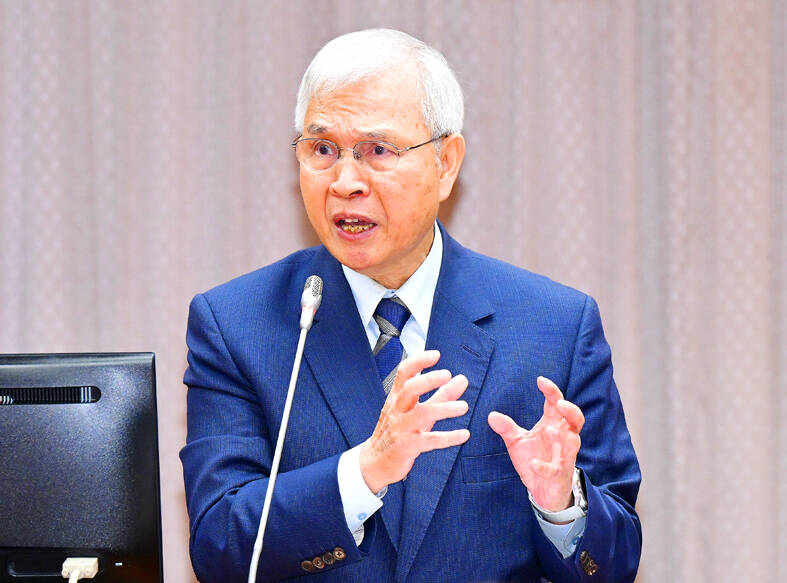STRATEGIC MATERIALS:
Taiwan’s advanced chips and tech help the US ‘stay ahead of China in technology competitions,’ central bank Governor Yang Chin-long said
By Crystal Hsu / Staff reporter
The incoming administration of US president-elect Donald Trump is unlikely to impose stiff tariffs on Taiwan’s advanced chips as well as information and communications technology (ICT) products, because they are special and strategic materials the US needs, central bank Governor Yang Chin-long (楊金龍) said yesterday.
“Trump’s trade policies may affect Taiwan’s economy and financial markets through multiple channels… We need to be careful in dealing with monetary policy and foreign exchange,” Yang said at a meeting of the legislature’s Finance Committee in Taipei.
After Trump’s return to the White House in January next year, it might become normal for Taiwan to be on the US’ currency manipulation watch list given the nation’s rising trade surplus with the US in the wake of US-China trade disputes, Yang said.

Photo: Liao Chen-hui, Taipei Times
Taiwan benefited from order transfers during Trump’s first four-year term, the governor said.
As a result, Taiwan met two of the three criteria the US Department of the Treasury uses to judge currency manipulation, namely a trade surplus larger than US$15 billion and a current account surplus in excess of 3 percent of GDP, Yang said.
The governor attributed the trade imbalance to aggressive purchases of advanced chips and ICT products by US tech titans to develop artificial intelligence and new-generation consumer electronic gadgets.
That prompted Yang to doubt Trump would raise tariffs on Taiwan’s exports as they are special and strategic materials the US needs.
“The trend [of advanced chips designed by the US and made in Taiwan] is sustainable, as the US is seeking to stay ahead of China in technology competition,” Yang said.
The central bank and the US Department of the Treasury exchange views on the currency matter twice a year, he said.
The trade friction between the US and China looks to escalate if Trump makes good on his campaign pledge to raise trade barriers with the world and set off another round of global supply chain realignment, Yang said.
Higher tariffs and production base relocation would raise production costs and fuel inflation, especially for firms that rely on imported raw materials, he said.
Such expectations have been reshaping the interest rate trajectory and accounted for the 1.8 percent decline in the New Taiwan dollar against the US dollar following Trump’s electoral win last week, Yang said.
Trade barriers might slow GDP growth in China, Taiwan’s largest export destination, and local firms should pay close attention, he said.
Taiwan could move to reduce trade surpluses with the US through massive procurement of US agricultural, energy and national defense products, Yang said.
Investment in the US by local firms is another solution, the governor said, citing the example of Taiwan Semiconductor Manufacturing Co (台積電).